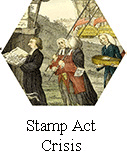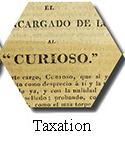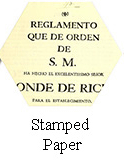        |
| |
Millions have no representation – Why should You? |
|
| |
15. Soame Jenins, The Objections to the Taxation of our American Colonies. London, 1765.
Soame Jenins viewed taxation as thoroughly justified and sought to disprove arguments that an Englishman may be taxed only by his own assent and general assent by a majority of elected representatives. |
|
| |
16. James Otis (1725-1783), Considerations on behalf of the Colonists. London, 1765.
Otis viewed Jenins’ “vain and insolent” tract as “chicanery and quibbling,” noting that it is enshrined in the British constitution that “no Englishman is or can be taxed but by his own consent in person or by his deputy.” It is at least since the Glorious Revolution true, he notes, that taxation even in Ireland must be supported by both British houses of Lords and Commons. |
|
|
17. Josiah Tucker, 1712-1799. Four tracts, together with two sermons, on political and commercial subjects. Gloucester, 1774.
To the American claim that they have been taxed without representation, Tucker counters that “millions” in Great Britain are similarly without representation, due to issues of law, history, and tradition. Those in Britain have had a stamp duty for many years, he notes, much larger than that for Americans. Independence will crimp economic opportunities for Americans (in trade with other colonies); and their military expenses will be great. He urges Americans to get out of their trance and wake up to their reasonable obligations! |
|
|
18. A letter to Doctor Tucker on his Proposal of a separation between Great Britain and Her American Colonies. London, 1774.
The anonymous author of this pamphlet assumes that Tucker’s proposal of separation must be meant as a threat to the Americans, who would become “the most wretched and miserable people that were ever on the face of the globe.” He asserts that they must be regarded as of one constitution with Britain. As there has been a constitution for Britain, so there must be one for the constituent parts of the whole British Empire. A separation would be ruinous for America; their religious liberties and civil rights would be endangered. |
|
|
19. Thomas Paine. Common Sense. Providence, 1886. (Nicholas Brown’s copy)
Thomas Paine's Common Sense was a runaway bestseller, being printed in no fewer than twenty-five American editions in thirteen cities. Brown Professor Emeritus, Gordon Wood, has described Common Sense as "the most incendiary and popular pamphlet of the entire revolutionary era" for its plainspoken advocacy of independence from British rule. |
|
| |
This symbol indicates the entire scanned book,
may be read on the John Carter Brown Library's Internet Archive collection. >>> |
|
| |
Exhibition prepared by dennis landis, kim nusco, neil safier, and kenneth c. ward.
on view in the reading room from october 2015 to january 2016. |
|